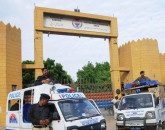Oslo’s many stories
Zealous bigotry can come from anywhere, as can murderous tendencies.

Oslo’s many stories
At the outset, there was the initial suspicion that al Qaeda was behind the attacks. When this was disproved, social media, the Muslim world at large and several columnists — including Charlie Booker writing for The Guardian with his usual vitriol — condemned the ease with which the erstwhile punditry had jumped to the Muslim connection. It was shoddy, they said. It was uncalled for. It indicates hatred and suspicion for Muslims, they noted furiously.
Apologies, but I find that argument to be a bit disingenuous. The immediate aftermath of an attack always raises conjecture about the assailants. The multiple blasts fit the mould of an al Qaeda attack — they’ve used this technique on Pakistani and Afghani targets more than once. When reports of shooting surfaced, the immediate suspicion was that it was perhaps a team of urban guerrillas, akin to the Mumbai incidence. The chain of reasoning might have been a bit hasty, but it was largely sound. When there are blasts in Spain, first suspicion usually falls on the Basque separatists. Islamists are usually not fingered in an attack in the North of Ireland — the now defunct but still gasping Irish Republican Army is deemed to be the obvious culprit. Violence in India’s ‘Red Corridor’ is almost always ascribed to Naxalites. But the Oslo attacks fit the al Qaeda mould before they were fitted into the Oklahoma bomber cookie cutter.
Then there was anger directed at the media for having sanctimonious ‘experts’ analyse Muslim-related issues of immigration and integration despite there being little connection. This ire is justified. But lest one forget, 24-hour news channels are like fecund, bloated millipedes, gorging themselves on conjecture while excreting half-baked conspiracies. But these channels are a function of consumer demand; they’ll keep broadcasting as long as eyes are glued to the television. There might be a conspiracy, but it’s one of economics, not racism.
The fact that current media is more biased than a soccer mom at a local game, or more pointless than a broken pencil, is mere testament to a toothless audience that tolerates and watches.
On a more constructive front, the attacks have led to a sudden and immediate disjoin within right-wing parties, says David Crossland in The National. Brievek was once a member of Norway’s Progress Party, which has in the past espoused concern about Muslim immigration and the dilution of western culture. From France and Germany to Denmark and England, the far right has been increasingly active and has also gathered clout. The violence perpetrated by Brievek, following a far more extreme version of conservative ideologies, is forcing these parties into U-turns, and a forced disassociation from previous xenophobic rhetoric.
The attacks, if anything, have also reminded us all that the real battle is never between faiths, creeds and skin tones. It’s between the tolerant and the intolerant, the accepting and the dogmatic, the rationalists and the zealots. It’s an apt reminder of which side of the fence we need to fall on, and that ideologues don’t have a specific hue or facial features. Zealous bigotry can come from anywhere, as can murderous tendencies.
And finally, it’s been confirmed. Social media is irony’s coffin. In response to the unneeded Muslim connection in the Oslo attacks, the twitterati set up a tongue in cheek #BlameTheMuslims hashtag, where they noted that Muslims could be blamed for bad weather, fever, or anything anyone chooses. Of course, hours later, the initial sarcasm was lost on everyone, and yells emanated on the internet over the utter bigotry on display. Between the original purpose and the shrill screams of new indignation, the hashtag trended and trended — a reminder of the utter facile nature of it all. As someone tweeted, Twitter is where irony goes to die.
Published in The Express Tribune, August 1st, 2011.



















COMMENTS
Comments are moderated and generally will be posted if they are on-topic and not abusive.
For more information, please see our Comments FAQ